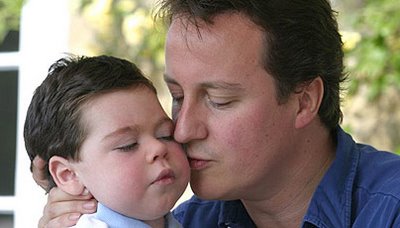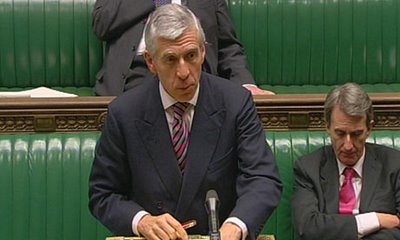 For those of us who are now becoming resigned to the sad fact that there is very real little difference between Labour and the Conservatives, and that even on some measures Tory policies are incredibly, conceivably to the left of Labour's, it sometimes takes a speech like today's by Chris Grayling, the latest non-entity to fill David Davis's rightful position, to bring you back to earth with a bump.
For those of us who are now becoming resigned to the sad fact that there is very real little difference between Labour and the Conservatives, and that even on some measures Tory policies are incredibly, conceivably to the left of Labour's, it sometimes takes a speech like today's by Chris Grayling, the latest non-entity to fill David Davis's rightful position, to bring you back to earth with a bump.
Unsurprisingly, the issue is crime/law and order. Ever since the death of James Bulger, which New Labour at the time shamelessly exploited, just as the Conservatives today equally shamelessly claim that the country is broken, there has been a devastatingly destructive war on who can be seen to be tougher. This war has delivered in Labour's approaching 12 years in power over 3,000 new offences and over 80,000 now locked up in prisons which are bursting at the seams. This has came against the backdrop of what is an unprecedented drop in crime (PDF) (with only a very few rejecting both the British Crime Survey and police's separate findings), the reasons for which are not clear, although the influence of policy itself is probably relatively minor when compared to demographic changes, especially an ageing population and an increase in general prosperity, hence the concern about a rise as we enter what looks like being a lengthy recession.
At the same time as this drop, the coverage of everyday disturbances and random, violent, vicious attacks has increased exponentially. Violent crime, for example, according to the BCS, peaked in 1995 and has been falling ever since; paradoxically, the police have recorded, since the statistics changed in 2002/03 and became incomparable with the previous ones, that violence has increased by 25%, hence the terrifying claims by politicians (including Grayling) that violent crime has risen by something like 80%, which it may have done if you're reasonably selective with the specific police figures. By any reasonable measure, Labour has lived up to its promise to be tough on crime; it has failed miserably, however, to be tough on its causes. To be fair, one is reasonably easy while the other is reasonably difficult. No prizes for guessing which is which.
Grayling is intent on being both, but if he does indeed become Home Secretary, you can be sure that it'll be the former that he'll implement and the latter which he will disregard, if indeed the Tories' policies on curing our "broken society" don't in fact make things worse. In any event, he begins with an example:
Let me tell you a story about life in Britain today. It was told me by the father of a serving soldier, who will be risking his life for us in Afghanistan this spring.
He was home on leave and was out in his local town centre when he was the victim of an unprovoked attack from behind by two youths. He was able to hold them off and the police were called.
He was left badly bruised after what was a completely unpremeditated attack.
The two young men were arrested, but then extraordinarily they were let off with a caution.
That's life in Britain today.
A nation where we appear so used to a violent assault of this kind that police only deem it fit for a caution.
And where the incidence of an attack like this is routine and not a rare exception.
Well, no, it isn't really extraordinary. You can quibble, but we don't know the exact circumstances of what happened here: this may well have been a first offence for both men; first offences invariably result in cautions, and as the only injury they seem to have inflicted was bad bruising, this doesn't really seem that outlandish or outrageous. It may be to the victim, but in all of these cases either the police or the Crown Prosecution Service will have decided whether it was in the public interest or not to bring the matter to court; they decided it wasn't. Grayling can want every such incident to be prosecuted, but he might decide otherwise when the court system becomes even further clogged up, when the prison population rises, and by the effect it has on those who find themselves with a criminal record and automatically excluded from an increasing number of jobs for what might have been a completely out of character incident influenced by alcohol or drugs. This is why prison and prosecuting need to be incredibly carefully considered: to declare across the board that everyone who does something should automatically be charged and if found guilty sent to prison, with the exception of the most serious crimes, is to ignore the nuances and multiple reasons for the original offence.
The real cause for concern comes very early on, and sets the tone for the rest:
It's time we dealt with the wrongs against society - not just the rights of their perpetrators. Fewer rights, more wrongs.
Doubtless Grayling just intends this as a flippant, populist remark, not intended to be taken as a statement of intent. Yet a time where few deny that we are facing an unprecedented reduction of liberty and where rights are being routinely curtailed at the expense of supposed security, this is a truly dangerous statement to make, and also seems to completely miss the current mood.
Next Grayling tries to paint a picture of a country disentegrating:
Another snapshot of a broken society.
Where antisocial behaviour is endemic.
Where violence has become a norm.
Where the offenders don't seem to give a damn.
Where carrying weapons is increasingly the norm.
Where families can be terrorised by teenage gangs.
Where pensioners are in fear of their safety from the troublemakers outside their houses.
Where too many communities are being disrupted by things that just shouldn't be happening.
On almost every one of these measures, the figures tend to suggest things are in fact improving; whether that continues during a recession is of course uncertain. This is of no concern to a politician who has a point to make, but such febrile exaggeration, which itself further scares people into imagining they will be victims of such behaviour, is unhelpful in the extreme. Grayling goes further by challenging the whole nature of what is defined as anti-social instead of criminal:
Worse still, many of the things that disrupt our society are now treated as almost a norm.
That's not good enough.
I call it crime - when somebody vandalises a bus stop - that's not anti-social it's criminal.
Indeed it is, and it's recorded as a crime.
When somebody shouts at an old person in the street and leaves them shaking and scared - that's not antisocial behaviour - that's criminal.
Err, no it isn't. As unpleasant as it might be, no crime has been committed, unless we intend to make shouting in the street an offence. What would the punishment be for committing this transgression?
When a teenager jumps on a car bonnet - that's not antisocial behaviour - it's criminal.
Not unless the jumping on the bonnet causes damage to the car - are we going to create a specific offence of jumping on a car bonnet to cover it?
This behaviour is far worse than being anti-social, it's anti-society.
And so Grayling adds even further to the Unspeak of political language. What exactly does anti-society mean? Can someone jumping on a car bonnet really be said to want to destroy society, which would be the presumed meaning of such a term?
The infuriating thing about Grayling's speech is that some of the analysis is spot-on - much of the passage about the causes of crime is accurate, although I would demure from his claim that it's a deep rooted issue affecting almost all of the country, which is bordering on being nonsense on stilts. It's just in the policy, which is of course crucial, where he falls completely down. He states that the government doesn't know what to do about it, but the truth is that no one does. He can only claim to know, without knowing what effect those policies he wants will in actuality have. He also, as previously noted, selectively uses crime figures to paint an alarming, inaccurate picture, such as here:
Violent crime is up almost 80% under Labour. Nearly 1.1 million violent crimes were recorded last year - half a million more than in 1998-99.
Robbery is up 27% under Labour.
Criminal damage is up past 1 million offences - that's nearly 3000 incidents each day.
There are over 400 serious knife crimes a week - 22,000 in one year.
Fatal stabbings up by a third.
Gun crime has nearly doubled under Labour - a gun crime was committed every hour in England and Wales in 2007-8.
Injuries from gun crime are up almost four fold.
And how has the Government responded?
By being soft on crime.
This is a page of diagrams and charts from the 2007/08 BCS which handily deals with some of these claims. The BCS, based on around 50,000 interviews, is regarded as more authoritative than the police figures which Grayling seems to be mainly relying on:
 What then are Grayling's solutions? Almost uniquely a step in the wrong direction:
What then are Grayling's solutions? Almost uniquely a step in the wrong direction:
Letting people out of prison early - that's soft on crime
Since Gordon Brown came to power 47,000 people have been released on early release, including 9,000 convicted of violence against the person.
Nearly 1000 crimes have been committed by criminals who have been released early.
Grayling doesn't offer an alternative to letting them out on early release, presumably for the reason that there isn't one. We cannot build ourselves out of an overcrowding crisis, or at least not quickly enough. 1,000 crimes committed by over 47,000 released early in fact seems to be an incredibly low figure, going by the re-offending figures which suggest that over half re-offend. There is very little here about actual prison reform, which could have an effect on crime levels and help to increase genuine rehabilitation, but that doesn't make for as good rhetoric as being tough on crime will.
Rejects our calls for a presumption of prison for those carrying a knife.
Lets five out of six offenders convicted of knife possession off without a jail sentence.
Automatically sending thos caught carrying a knife to prison is probably the worst use of jail that could possibly be envisaged, and designed to further embitter those who carry it out of fear that just one time, who find themselves being made an example of in the very worst case of "sending a message". The less direct restrictions on a judge's personal discretion the better.
After a couple of old Blair quotes, we have something approaching Grayling's thoughts on what to do on targeting the causes of crime:
In true backstreet fashion, Gordon Brown took all four wheels off welfare reform back in the 1990s when he disagreed with Frank Field thinking the unthinkable. He left it on four piles of bricks for a decade, and only now have we persuaded them to start to be as radical as is needed. Even so, we've still only had words and not action.
Is there any evidence that Purnell's or the Tories' welfare reform will have any great impact on crime? Not much, unless you consider that it might in fact increase it when you effectively impoverish a distinct minority as may well happen, especially to the young people that Grayling previously proposed should form "chain gangs" if they couldn't find a job within 3 months or actively refused one. Prison looks attractive by comparison. Then there's a piece of evidence which directly contradicts the entire Conservative message on the "broken society":
Recent analysis suggests that around 2% of families - or 140,000 families across Britain - experience complex and multiple problems. When parents experience difficulties in their own lives, it can have a serious and lasting effect on both their and their families lives. The consequences of family breakdown can influence the rest of peoples individual lives and may also carry significant costs for public services and the wider community.
That 2% undoubtedly affects a far larger proportion than it actually makes up, but 2% does not a broken society make. Again though, that simply wouldn't make for effective rhetoric. 2% of our society is broken doesn't have the same ring to it.
The area which stands as a totem of Labour's failures to get to grips with the causes of crime is drugs.
UK drug abuse is the worst in Europe. A report by the UK Drug Policy Commission found that the UK has the highest level of problem drug use and the second highest level of drug-related deaths in Europe.
The UK is the cocaine capital of Europe. A report by the European Monitoring Centre for Drugs and Addiction, which compared drug use in 28 countries in Europe, revealed that the UK has the highest proportion of cocaine users amongst adults and 15 and 16 years olds.
The UK has the third highest teenage cannabis use in the OECD.
Half of prisoners are drug addicts - some prisons report up to 80% of inmates testing positive for class A drugs on reception.
Drug offences are up 68% - there were 228,958 recorded drug offences in 2007-8 - that's more than 600 per day.
He states all this, but he doesn't ask why. Why are we so dependent on drugs, in comparison to the rest of Europe? Is it something wrong with our work-life balance? And then there's the whole message which this also gives: prohibition has comprehensively failed. It's time that we tried legalisation, yet that is completely anathema to the Conservatives, more so even than it is to the evidence-ignoring New Labour. Having addressed the causes, or rather listed them rather than addressed them, he cops out completely:
But tackling the causes of crime was a key part of my last job. If I am Home Secretary after the next election, my job is very simple - to be tough on crime.
A good soundbite, but a staggering lack of aspiration and ambition, those very things that government constantly wants to inculcate, for any politician.
We are then onto supposed concrete policies. A more sorry bunch could not be dreamt up, starting with some complete nonsense:
The first is to find a 21st century alternative to what would once have been a clip around the ear from the local bobby.
Plenty of teenagers stray off the straight and narrow sometimes.
But today there are no consequences when they do.
Really? No consequences whatsoever? Even if this were the case, shouldn't we be encouraging parents to put in consequences rather than relying on the law instead?
All too often if you look at the case of a fifteen or sixteen year old who is starting to commit serious crimes, you find a story of years of minor misdemeanours that have all too often gone unpunished.
That just can't be right.
I don't want to criminalise children - but I do want our police and our society to be able firmly to say No. Before those young people get used to flouting the law.
...
Ministers are now even proposing measures to move on ten year olds if they are causing trouble in the evenings. I don't think we should be shifting ten year olds out of their home areas - I think we should be sending them home to bed.
So I will instruct our police to remove young troublemakers from our streets altogether, not just move them on to disrupt a different street.
If police find young people doing something stupid out in their communities, I think we should give them the power, sometimes, to take them back to the Police Station and make their parents come and get them. For their own safety and protection as much as anything.
We're exploring the best way of making this possible but it's got to be the right thing in some cases.
This seems to be a recipe for ridding children and the young from the streets when no crime or otherwise has been committed, on the whim of the officers themselves. "Something stupid" - I can see that looking good in the legislation.
Our police should have powers to go straight to a magistrate and get an order against that troublemaker confining them to their homes for up to a month - except for during school hours. And if they break that curfew order they should expect to find themselves in the cells.
Grayling then doesn't want to criminalise children... except he does. He's talking about potentially "grounding" troublemakers, not potentially anyone who has ever committed any crime, with those who then break that order being sent to the cells. There is not just huge potential here for abuse and casual victimisation, but also again it's riding roughshod over parental responsibilities. They should be the ones grounding the child, not the courts, if indeed there are grounds to "grind" them in the first place. This is taking ASBOs and making them even worse.
In my own constituency, I've learned two lessons on tackling antisocial
behaviour from the local police.... that's when they've got it right. A clash between two gangs of youths a few years ago was dealt with by thirty police, dogs and a helicopter overhead. The trouble has never been repeated.
Grayling is MP for the mean streets of Epsom and Ewell. That there was no repeat doesn't mean that it was the police action which halted it; it might well have been an isolated incident which was patched up regardless of it. This is hardly evidence-based policy making.
There is now a strong case to end Labour's twenty-four hour drinking regime. It has not created a continental café culture - it has just made things worse in many town and city centres.
Except this is the opposite of the truth, as John Band noted. We do have a drinking problem, but again we have to examine why that is rather than go back to ridiculous previous laws which failed just as much.
The third thing we need to do is to stop the ridiculous system of cautions that has built up even for serious offences.
Remember that young soldier, beaten up by local hoodlums.
Why did the police choose to caution the offenders?
Because issuing a caution means case closed - a tick in the box - a crime solved for the official figures to be sent to the Home Office.
And avoiding the danger that the Crown Prosecution Service will say - three young men, a fight - too difficult to prove so we won't bother.
That's just not good enough.
Some cautions are undoubtedly down to a lack of imagination or lack of belief that it's worth going through the rigmarole of a court case, but for the most part they are actually usually the right punishment. Politicians shouldn't second guess police into ordering them to not issue cautions - that's just as bad as Labour's myriad of targets. If the Conservatives want to free police to do their jobs as much as possible, then they shouldn't put other restrictions on them either.
The fourth change we desperately need is that oldest political of political chestnuts. More police on the streets. More bobbies on the beat.
May as well stop it here, as again, the evidence suggests that "bobbies on the beat" is an incredibly bad way of using police resources. Nick Davies wrote a whole series on this back in 2003 which effectively debunked the entire idea. It still though remains the simplest and easiest way to win press and popular support.
Grayling finishes with a flourish:
The Conservatives are the party of law and order - law and order based on common sense, strong families and communities and a system which places the victim above the criminal.
Labour has had eleven years and they have collectively failed - their musical chairs based system of Home Secretaries has left Britain a more dangerous, less civilised place to live in.
Two more nonsensical paragraphs would be difficult to come up with. Anyone who makes allusions to common sense should be considered suspicious, when "common sense" is often the actual inverse of it, just as how if you say the reverse of what you've just said it probably tells you it isn't worth saying. The idea though that Labour's lack of continuous Home Secretaries has somehow made the country more dangerous and less civilised is hilarious: more accurate is that they've made the country less civilised through their criminal justice policies; getting rid of the lot of them and not having one at all could have undoubted beneficial effects. One thing however is clear from this dire, dismal, predictable speech: Chris Grayling and the Conservatives have the potential to be even worse than New Labour.Labels: British crime survey, Chris Grayling, Conservatives, crime, crime policies, fisks, law 'n' order, speeches, the new Blairites




